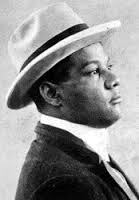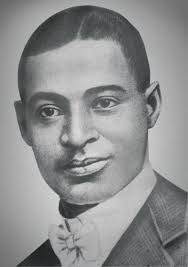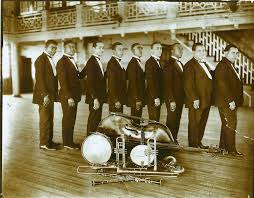The Lost Place
by Con Chapman
Perez, he said first that he was a much
better cornet player than Buddy Bolden;
not as good a showman, but sincere.

He stuck to his instrument while Buddy
did things that got him noticed,
stomping his foot, waving his hand.
Manuel didn't make a spectacle of himself.
When you saw him in a parade, Bechet said,
you knew that was a man you was seeing.
All you knew about him was he was married,
while Buddy had women follow him around

in the street, carrying his trumpet, and his watch
and his handkerchief, just so everybody knew
he had three or four gals living with him.
Different as could be, the two men played all
their short lives, but ended in the same way;
Buddy in the Jackson Mental Institution
at the age of 30, Manuel—after a stroke—
slobbering at the mouth at 59.
Why, Bechet asked, did that happen so much?
Why did the ones who were really great
and who really played—when they went,
They just went crazy, so many of them.

Was it in the music? Did it empty you out?
he asked. He lay awake nights thinking
about it and decided it was the thing inside
the man himself—he called it “the lost place.”
He's got to go there to make his music.
It tears a man to pieces, he said, maybe
the music makes it worse, maybe not.
There's that sadness; some men can laugh
in the lost pace, if they hear the laughing
inside, but the laughing don't
put it out of sight, it goes with the
lost place, he said—laughter and madness.
|
4
favs |
1495 views
6 comments |
277 words
All rights reserved. |
Author's Note
The author has not attached a note to this story.
Other stories by Con Chapman
Tags
This story has no tags.
I always feel when I read your work that I'm getting the best of the 20th century. Your writing has no fear rather a certainty that is reassuring.
Thanks very much. I think it needs some work, more of an idea for a poem right now.
Waiting to laugh, but this is even better. *
An education.
Con-I especially enjoyed this piece.
For a number of years I played clarinet in a traditional i.e. Dixieland, jazz band of some repute. In addition to making a ton of money, the music made all of us crazy. We often wondered if the music made us do stupid things, or we were somehow predisposed to be seduced by the music and its effect on the audiences. Seems every gig turned into a wild and crazy party, even when we played in rather sedate settings. A Republican breakfast fund raising event in a Hilton hotel comes to mind with the audience following the band around the parking lot to South Rampart Street Parade" at 8:30 in the morning.
Daniel--
I read of a study a few years back that musicians who performed primarily modernist pieces reported a much higher number of illnesses, physical and mental (e.g., depression) than their peers. While one of my best friends is a modernist composer, have to say it makes sense.